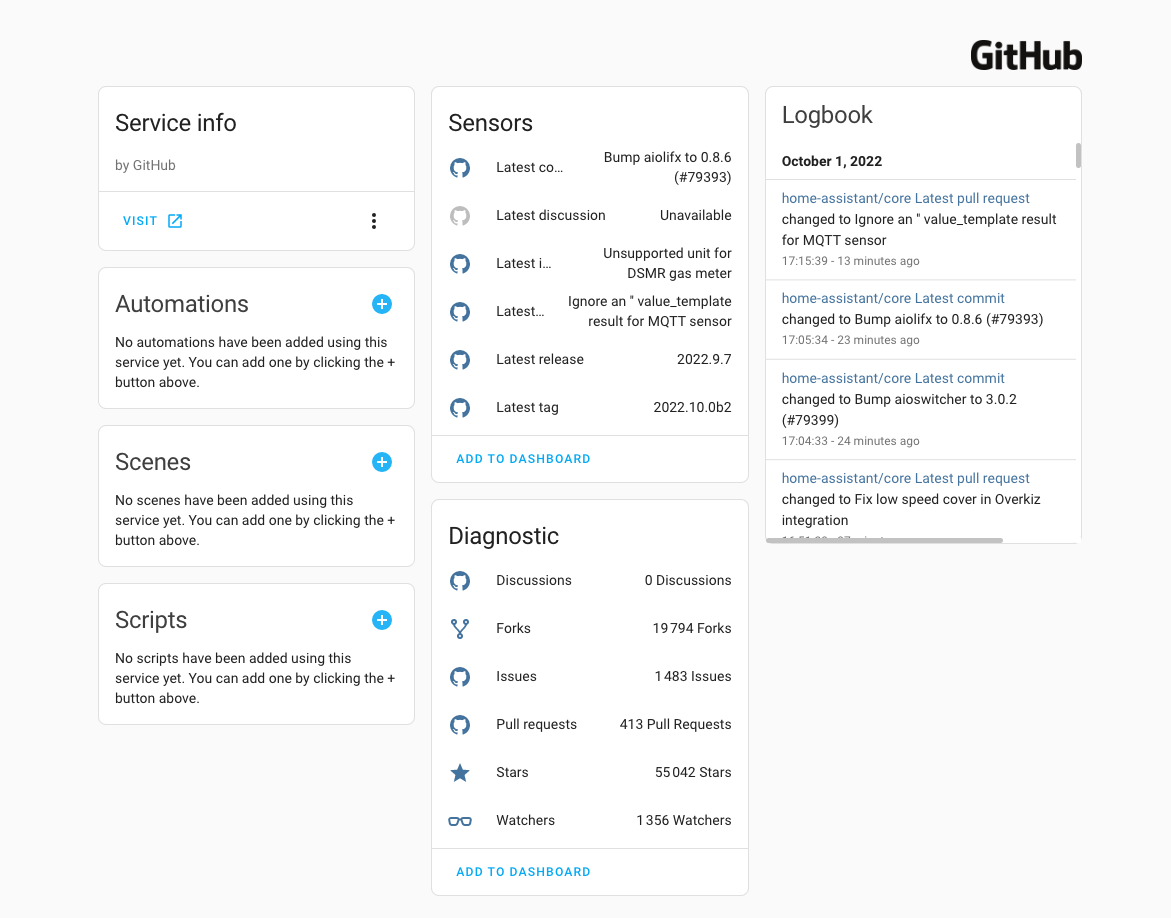GitHub
The GitHub integrationIntegrations connect and integrate Home Assistant with your devices, services, and more. [Learn more] allows you to monitor your favorite GitHub
Configuration
To add the GitHub service to your Home Assistant instance, use this My button:
If the above My button doesn’t work, you can also perform the following steps manually:
-
Browse to your Home Assistant instance.
-
In the bottom right corner, select the
Add Integration button. -
From the list, select GitHub.
-
Follow the instructions on screen to complete the setup.
When you set up this integration, you will first be guided to allow the integration to use the GitHub API
When you have authorized the integration, you select repositories you want to monitor, the list contains repositories you have created and starred
The integration works by subscribing to events on the repository to provide a push-like experience for the entities, which means that when a new issue is created or when someone open up a pull request with some fixes or when that new release you have been waiting for just got released this integration will help you get the information as soon as it happens.
Remove authorization
After you have removed the integration from Settings > Devices & services, you need to manually revoke OAuth app authorization.
- Go to your Authorized OAuth Apps
- Find the “Home Assistant GitHub Integration” application
- Click the 3 dots (
...) to the right of the name - Select “Revoke”
Action
When you configure a repository to be tracked in this integration it will be represented as a service in the device panel and all entities related to the repository will be nested under that device. The device also provides a link to the repository on GitHub and an option to download diagnostics for the service.

Provided entities
Latest commit
This sensor shows the message of the latest commit done in the default branch as the state.
The sensor provides additional attributes for the latest commit:
-
sha: The SHA for the commit -
url: A URL that will show you the commit on GitHub
Latest discussion
This sensor shows the title of the latest discussion that was created as the state.
The sensor provides additional attributes for the latest discussion:
-
number: The numerical ID that discussion was assigned -
url: A URL that will show you the discussion on GitHub
Latest issue
This sensor shows the title of the latest issue that was created as the state.
The sensor provides additional attributes for the latest issue:
-
number: The numerical ID that issue was assigned -
url: A URL that will show you the issue on GitHub
Latest pull request
This sensor shows the title of the latest pull request that was created as the state.
The sensor provides additional attributes for the latest pull request:
-
number: The numerical ID that pull request was assigned -
url: A URL that will show you the pull request on GitHub
Latest release
This sensor shows the title of the latest release that was created in the repository.
The sensor provides additional attributes for the latest release:
-
tag: The tag name that the release is created for -
url: A URL that will show you the release on GitHub
Latest tag
This sensor shows the title of the latest tag that was created in the repository.
The sensor provides additional attributes for the latest tag:
-
url: A URL that will show you the commit the tag was created for on GitHub
Diagnostic entities
These entities are simpler diagnostic entities without any additional attributes:
- Discussions: Shows the number of discussions
- Forks: Shows the number of forks
- Issues: Shows the number of open issues
- Pull requests: Shows the number of open pull requests
- Stars: Shows the number of stars
- Watchers: Shows the number of watchers
Automation
Here are some small examples on how you can automate using the provided entities from this integration.
Remember that the action names and entity IDs used in these examples are examples as well, you need to replace it with actions and entities that you have in your installation.
Notify new releases
This example uses the Latest release entity provided by this integration, and a notify action,
triggers:
- trigger: state
entity_id: sensor.awesome_repository_latest_release
actions:
- action: notify.notify
data:
title: "New github/repository release"
message: >-
Link to the new release:
https://github.com/github/repository/releases/{{ trigger.to_state.state }}
Notify new stars
This example uses the Stars diagnostic entity provided by this integration, and a notify action,
triggers:
- trigger: state
entity_id: sensor.awesome_repository_stars
actions:
- action: notify.notify
data:
title: "New github/repository new star"
message: >-
github/repository was starred again!
Total stars are now: {{ trigger.to_state.state }}